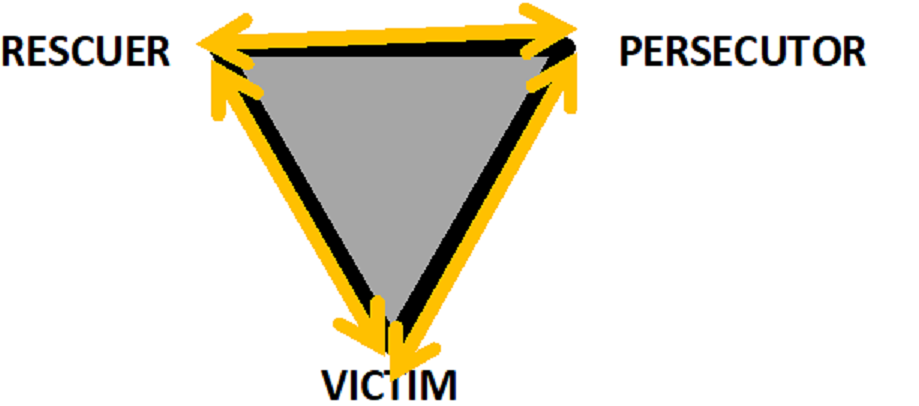Victim-Rescuer-Persecutor Triad
Stories We Pretend Are True
You know those times when you hear something and as the words flow into your consciousness, you find yourself reflecting, “oh wow, I have done that”. This week I found myself contemplating the Victim-Rescuer-Perpetrator Triangle. An interdependent relationship dynamic that causes drama but limits our potential for growth. It is interesting to examine times I have played the various roles, and also how these dynamics play out in relationships- from familial to communal to political.

The Victim
Always relegated to the bottom of the triangle. The Victim feels trod upon and wounded and that fate is against them. It can win other’s mercy and sympathy. Anyone or everyone else is to blame and the Victim themselves innocent and powerless to change outcomes. From this frame of mind change is impossible.
Questions to pose when one notices the Victim mindset trying to superimpose itself: What needs are unmet? How does seeing oneself as the Victim create a beneficial outcome? Could things be different? Are you truly powerless in the situation? From a different perspective how else could the situation be viewed?
This is not to discount that power is abused and that truly horrible things happen that require compassion and healing. Yet being the Victim should not be a chronic condition that we integrate into our identity. Acknowledging one’s strengths and resilience is a key part of moving forward.
THE RESCUER
Following a law of attraction, there are also Rescuers/Heroes/Enablers. The Rescuer feels compelled to “save” others that they perceive as vulnerable or helpless. Being the hero feels good, right? On the flip side, assuming the identity of Rescuer can be a way of distracting oneself so as to avoid confronting issues in one’s own life.
Questions to pose when one notices they are following into the Rescuer mindset: Is the Victim asking to be rescued? Can those who are not ready or do not want to be rescued be rescued? What is the difference between helping and rescuing? How does one benefit by these actions? What is being avoided?
THE PERSECUTOR
To complete the magnetic attraction there are the villains or “bad” people. Persecutors often do not comprehend the destructive effects that their influence is having on others or the extent of their power over others. Bullying, control and manipulation, anger, superiority are tools of this position. A lack of empathy for others, rigidity, making others feel they are never good enough or not of value solidifies the persecutor’s position.
Questions to pose when one notices they are adopting the Persecutor mindset: Is this who I really want to be? What is gained by trying to force ones’ own agenda? Are you open to another perspective? Can you fully appreciate other’s feelings ? Are you recognizing other’s intrinsic value? What other possibilities are there?
Most fascinating is that though we tend to have an affinity toward playing one of these roles more than others, we paradoxically alternate between these various roles when in different company or situations. A victim can get satisfaction from playing the perpetrator and feel atoned that they are not to blame as in their mind they are still a victim.
At this current time, it is interesting to think about how our participation in these roles deepen and perpetuate our divisions.
These roles are not who we are. We tell ourselves stories about how much power we do or don’t have and then believe this thing we made up about ourselves. It’s never easy to break out of roles we have practiced or that hold a potential benefit for us. AND it is always possible to learn new ways of being and interacting in our lives. It takes courage to break patterns: awareness and practice are our guiding forces.
We are works in progress, it is time to accept our imperfections as part of the daily practice of being human. We have unlimited potential for transformation, if we choose to believe in that option.

